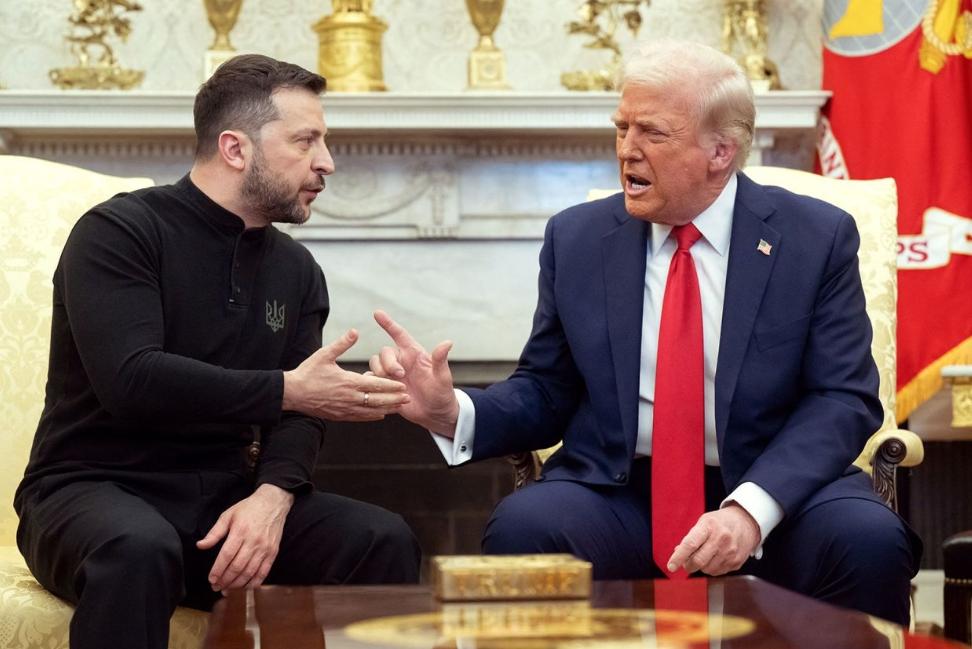
In early March 2025, the international political stage was once again roiled by a fierce debate that took place in the White House. This dispute not only put the relationship between the United States and Ukraine in an awkward position but also sparked strong reactions in several European countries. The dispute not only revealed the intricate web of interests in international politics but also highlighted the unstable factors in the current international landscape.
On February 28, 2025, Ukrainian President Volodymyr Zelenskyy visited the United States, planning to sign a mineral agreement and seek additional military assistance. However, his meeting with U.S. President Donald Trump and Vice President Mike Pence in the Oval Office turned into a public dispute. This dispute quickly became the focus of global attention, with media outlets describing the meeting as "shocking" and "disastrous."
According to reports, the dispute was triggered by Zelenskyy's questioning of Trump's stance on the Russia-Ukraine conflict. Zelenskyy emphasized that the United States should provide security guarantees to Ukraine and launched a personal attack on Russian President Vladimir Putin. Trump, on the other hand, accused Zelenskyy of being ungrateful for U.S. support and unwilling to make necessary concessions to end the conflict. The exchange of words became heated, emotions escalated, ultimately leading to this awkward and chaotic dispute.
This dispute not only cast a shadow over U.S.-Ukraine relations but also elicited strong reactions from multiple European countries. Leaders across Europe voiced their opinions, calling on both sides to remain calm and resolve their differences through dialogue and negotiation.
The White House dispute quickly sent shockwaves through multiple European countries, with leaders from various nations expressing their views on the matter. French President Emmanuel Macron was the first to call for calm between the U.S. and Ukrainian leaders and indicated that he did not rule out the possibility of dialogue with Russian President Vladimir Putin. Macron's statement reflected France's complex position on the Russia-Ukraine conflict, namely, the desire to maintain European security and stability while avoiding excessive provocation of Russia.
German Chancellor Olaf Scholz also expressed concern about the situation, emphasizing that Germany would continue to firmly support Ukraine but urging both sides to resolve the dispute through dialogue. Scholz's statement reflected Germany's cautious approach to the Russia-Ukraine conflict, unwilling to be drawn into the conflict or harm Europe's security interests.
British Prime Minister Starmer extended a warm welcome to Zelenskyy and signed a loan agreement worth over £2.2 billion during Zelenskyy's visit to the UK,旨在 supporting Ukraine in strengthening its defense capabilities. Starmer's words and actions demonstrated the UK's firm stance on the Russia-Ukraine conflict, fully supporting Ukraine and willing to take on more international responsibilities.
In addition to these countries, Poland, Italy, and the Netherlands, among others, also expressed their positions on the matter, expressing support for Ukraine and concern about the Russia-Ukraine conflict. These countries' statements reflected Europe's common stance on the Russia-Ukraine conflict, namely, maintaining European security and stability and calling on both sides to resolve the dispute through dialogue and negotiation.
The White House dispute not only shocked multiple European countries but also introduced new variables into the international political landscape. Firstly, the dispute exacerbated tensions in U.S.-Ukraine relations, making the U.S. stance on the Russia-Ukraine conflict more complex and unpredictable. The divergence between the Trump administration's hardline stance and the Zelenskyy government's firm position poses new challenges to cooperation between the U.S. and Ukraine.
Secondly, the dispute also raised questions among European countries about U.S. reliability. European countries have long hoped that the U.S. would play a greater role in the Russia-Ukraine conflict, but the Trump administration's hardline stance and unwillingness to take on more international responsibilities have disappointed and concerned European countries. This may prompt European countries to seek solutions to the Russia-Ukraine conflict more autonomously and strengthen cooperation with other countries.
Finally, the dispute has also heightened international concerns and anxieties about the Russia-Ukraine conflict. The conflict has been ongoing for years, significantly impacting the international political landscape and security stability. The occurrence of the White House dispute may further intensify tensions between Russia and Ukraine, making the conflict even more difficult to resolve.
The recent dispute in the White House, which has shocked multiple European countries, once again highlights the complexity and uncertainty of the international political landscape. In international relations, entanglements of interests and differences among countries are inevitable, but the key lies in seeking consensus and solutions through dialogue and negotiation. Faced with unstable factors and challenges in the current international situation, countries should remain calm and rational, strengthen communication and cooperation, and jointly promote peace and development in international relations.
At the same time, facing the global challenge of the Russia-Ukraine conflict, countries should also work together to seek a peaceful solution. Only through dialogue and negotiation can true peace and stability be achieved, bringing a better future to the international community.

Since 2022, the Fed has cumulatively reduced its balance sheet by $2.4 trillion through quantitative tightening (QT) policies, leading to a near depletion of liquidity in the financial system.
Since 2022, the Fed has cumulatively reduced its balance sh…
On December 11 local time, the White House once again spoke…
Fiji recently launched its first green finance classificati…
Recently, the European Commission fined Musk's X platform (…
At the end of 2025, the situation in the Caribbean suddenly…
The U.S. AI industry in 2025 is witnessing a feverish feast…